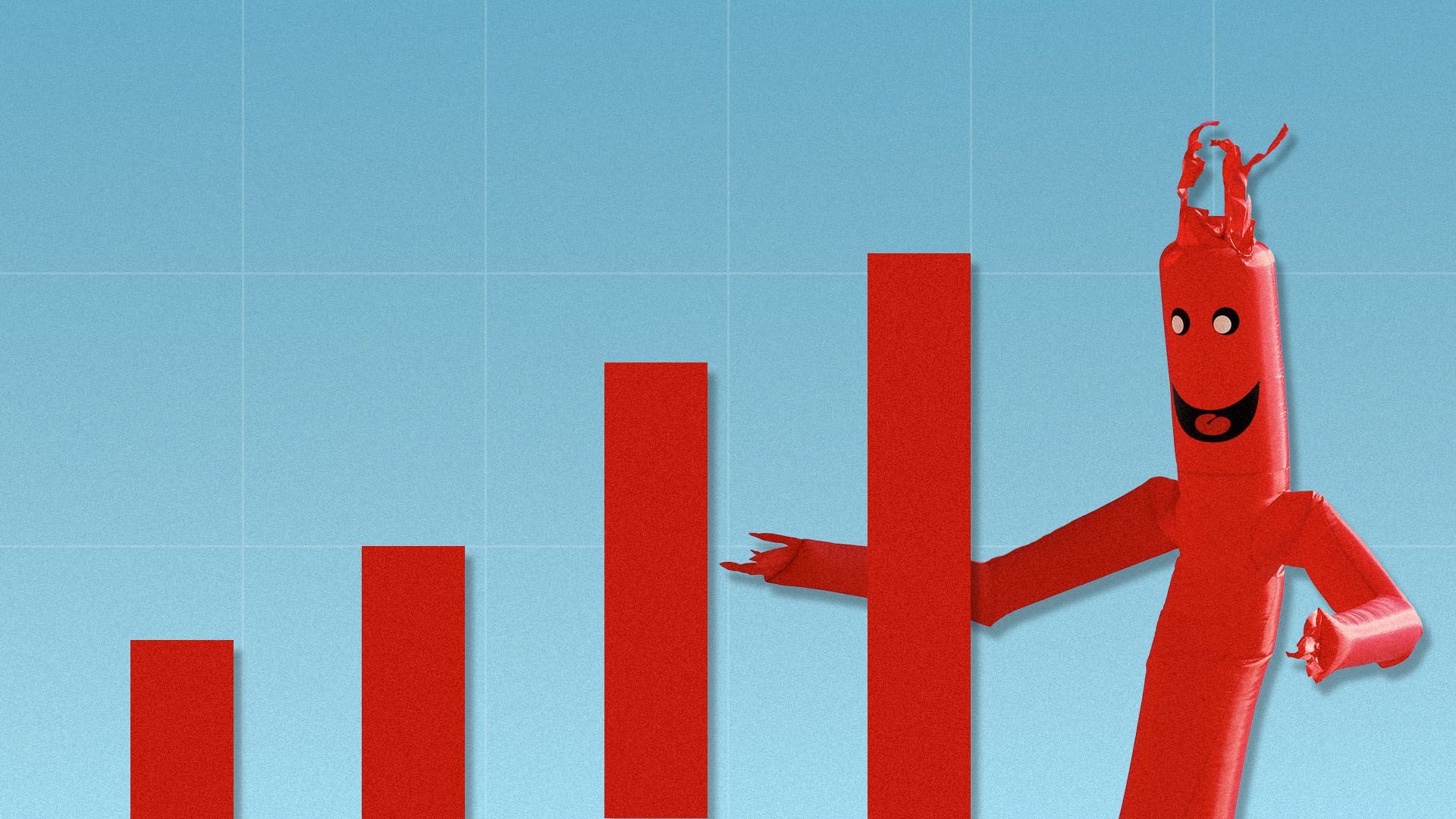| | | | | | | Presented By Northern Trust | | | | Axios Markets | | By Aja Whitaker-Moore ·Dec 23, 2020 | | Hi! Our time together has been short, but sweet. Dion will be back in your inbox in January. Stay in touch at aja.moore@axios.com and on Twitter @ajawmoore. Situational awareness: President Trump threw a curveball into the seemingly never-ending battle over stimulus last night by asking Congress to amend the $900 billion coronavirus relief bill. - Investors shrugged off the surprise this morning, with futures on the S&P 500 index ticking up just 0.23% at 7am.
(Today's Smart Brevity count: 1,254 words, 4.7 minutes.) 🎙"Workin hard may help you maintain — to learn to overcome the heartaches and pain." | | | | | | 1. Inflation hawks circle |  With nearly $3 trillion in lending from the Fed this year, and Congress approving $900 billion in debt-financed spending on top of the $3.1 trillion budget deficit in fiscal year 2020, inflation hawks are sounding the alarm, Axios' Dion Rabouin writes on his way to a much-deserved vacation. Why it matters: "Inflation staying low and well-behaved is the foundation on which everything in markets is currently priced," Karen Ward, chief market strategist for Europe at JPMorgan Asset Management, told FT. - "Investors' assumption is that central banks will be able to stay accommodative well into the economic recovery. If inflation picks up in a way that's not expected, that would challenge the market's entire view."
The big picture: Most major asset managers are predicting a significant return to growth for the U.S. economy next year, but some worry the release of pent-up demand — as mass vaccinations end the coronavirus pandemic's depressing hold on prices — will lead to a return of inflation. What's happening: Indicators already have been perking up, with inflation in "pandemic products" spiking (world food prices rose at the fastest rate in six years last month), even as official metrics like consumer price indexes have shown no reason for worry. - Precious metals' prices are rising again, with gold touching its highest level since early November late last week and silver on a six-session winning streak, hitting its highest since Sept. 22 on Monday.
- Five-, 10- and 30-year breakeven inflation rates are all rising near 2% and the 10-year rate, at 1.95%, is just 2 basis points from its highest point since November 2018.
- U.S. money supply, M2, continues to rise at breakneck speed.
The intrigue: "How concerned should we be?" Bank of America's global economics team wrote in a note to clients. "With low inflation woven into the fabric of capital markets, significantly higher inflation today could be more even more painful than in the past." Yes, but: BofA analysts echoed the sentiments of most Wall Street strategists and fund managers saying they "expect many inflation head fakes before the real deal arrives." Yes, but, but: The Fed has pledged not to raise U.S. interest rates until inflation has run above its 2% target for some time. That risks letting rising prices get out of hand, economists warn. |     | | | | | | 2. Catch up quick | | The Justice Department sued Walmart over allegations that lapsed screening at the company's pharmacies are fueling the opioid crisis. (Axios) Restaurant workers can be forced to share tips, according to a final rule from the Labor Department. (WSJ) Pfizer struck a deal with the Trump administration to provide 100 million additional vaccine doses. (Press release) |     | | | | | | 3. Housing and consumer confidence sputter |  Data: NAR; Chart: Axios Visuals Momentum in the housing market is slowing, just as consumer confidence is also showing weakness. Why it matters: Year-end economic data tells a familiar 2020 tale of the haves and the have nots staking out their positions in the final months of the year. Driving the news: U.S. home sales ended a five-month streak, the National Association of Realtors (NAR) reported Tuesday. Existing homes for sale in November fell 2.5% from October to a seasonally adjusted annual rate of 6.69 million in November. Yes, but: In spite of the pandemic, total sales skyrocketed 25.8% to 5.32 million when compared to the prior year. - Median home prices also increased 14.5% to $310,800 from November 2019.
By the numbers: As coronavirus continues to rage, the Conference Board said its consumer confidence index dipped in December to 88.6, versus 92.9 in November. Assessment of current business and labor market conditions also took a dive to 90.3 from 105.9. What they're saying: "The US economy is showing a bifurcated outcome," says NAR Chief Economist Lawrence Yun. "So those who are homeowners and have exposure to the stock market, and office workers who can work from home, are immune to recession. It's all good for half of the country." What to watch: More data points will be added to the economic picture today, with jobless claims, consumer spending, home sales and manufacturing statistics all on deck for release. |     | | | | | | A message from Northern Trust | | The wealth planning trifecta | | |  | | | | The trifecta of low interest rates, high exemption amounts and uncertain tax policy future make it a good time to revisit your wealth plan to prepare for an uncertain future. Learn how to take advantage of this window of opportunity from Northern Trust's The Wealth Planning Trifecta report. | | | | | | 4. The record-breaking stimulus |  Data: Axios Research; Chart: Andrew Witherspoon/Axios The latest COVID-19 relief package is much smaller than most Democrats wanted, and is less than half the size of the CARES Act that was passed earlier this year, Axios' Felix Salmon reports. - But put the two together, and the amount of stimulus passed by Congress in 2020 would dwarf any previous U.S. government spending program — even the New Deal.
- Why it matters: President Trump's suggestion that he might not sign the bill without changes throws the whole package into doubt.
- But even if that gets resolved, Team Biden has made it clear that they want massive new rounds of stimulus in 2021, directing money to state and local governments as well as executing on their promises to "build back better" with a multi-trillion-dollar investment program.
- All of that spending would come on top of $2.9 trillion of stimulus passed in 2020 — an amount equivalent to a whopping 14.5% of GDP.
The big picture: Before this year, America's largest-ever spending program was Barack Obama's American Recovery and Reinvestment Act — which clocked in at just over $1 trillion, in today's money. - On a per-capita basis, or as a percentage of GDP, the record was held by Franklin Delano Roosevelt's New Deal of 1933-35, which spent about $6,680 of today's dollars for every living American. That amounted to 12.6% of GDP at the time.
- Both records could be smashed this year, with stimulus so far totaling some $8,845 per American. And if Biden gets his way, there's a lot more to come.
|     | | | | | | 5. SEC blesses new way to raise capital |  | | | Illustration: Aïda Amer/Axios | | | | The U.S. Securities and Exchange Commission finally approved on Tuesday a rule change that will allow companies going public on the New York Stock Exchange to simultaneously raise primary capital, Axios' Kia Kokalitcheva reports. Why it matters: Despite the surge in interest in the last couple of years, direct listings have struggled to appeal to a wide swath of companies since many still need to raise capital when going public. Background: Spotify's direct listing in 2018, which allowed the company's shareholders to begin trading their shares on the stock market, sparked growing conversations over the need for alternatives to the traditional initial public offering. - Common arguments have included the need for better pricing mechanisms.
- Lock-up periods preventing employees and some other shareholders from selling for months can also be viewed as another shortcoming.
|     | | | | | | 6. Used car dealers are suddenly popular |  | | | Illustration: Sarah Grillo/Axios | | | | An often underrated side of the auto industry — used car sales — is the hot new thing for some automakers who sense they are losing lucrative business to online newcomers, Axios' Joann Muller reports. Why it matters: While feasting for years on profits from expensive SUVs and trucks, many automakers have forfeited the lower end of the market at precisely the time many COVID-wary consumers are looking for an affordable alternative to public transportation. What's happening: Fast-growing digital used-car retailers like Carvana and Vroom are taking advantage of the vacuum by making it easy for budget-constrained consumers to find the car they want, complete the purchase online and then have it delivered to their doorstep. - "Everything that you could do in a dealership, you can do directly with Vroom — the financing, the extended warranty. Quite literally you never have to go to a dealership again," said Paul Hennessey, CEO of Vroom, which went public in June.
- That has some traditional carmakers worried that their pipeline of future buyers is drying up.
The big picture: Vehicle affordability has been a growing problem even before the pandemic. - The average transaction price of new vehicles today is over $39,000, according to Kelley Blue Book.
- The average list price of used cars, meanwhile is about $21,700, per Cox Automotive.
Driving the news: Both Honda and Ford in recent weeks said they are building online used-car platforms to grab a larger slice of pre-owned vehicle sales. |     | | | | | | A message from Northern Trust | | How to relocate with taxes in mind | | |  | | | | Relocation is top-of-mind for many people this year because of potential tax savings and remote working becoming the norm. But before relocating, consider the broader impact of the move and understand the requirements to establish residency. The tax factors to consider. | | | | 🎙Quote: "Workin hard may help you maintain — to learn to overcome the heartaches and pain." Why it matters: I got a lot of love yesterday for my musical shoutout. Since Martin Shkreli re-entered our collective psyche this week, it only seemed fitting to highlight the revolutionary rap group Wu-Tang Clan and their classic C.R.E.A.M track. Get the money, dollar dollar bill, y'all. 🙌🏾 Happy Holidays! 🥂 | | | | Axios thanks our partners for supporting our newsletters.
Sponsorship has no influence on editorial content. Axios, 3100 Clarendon Blvd, Suite 1300, Arlington VA 22201 | | | You received this email because you signed up for newsletters from Axios.
Change your preferences or unsubscribe here. | | | Was this email forwarded to you?
Sign up now to get Axios in your inbox. | | | | Follow Axios on social media:    | | | | | |









No comments:
Post a Comment